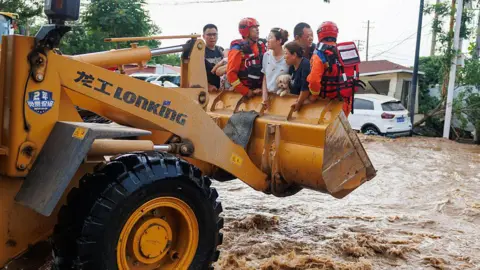**Beijing Floods Claim 30 Lives Amid Extreme Weather in China**
In a devastating turn of events, Beijing has experienced catastrophic flooding that led to the deaths of at least 30 individuals while over 80,000 residents have been forced to evacuate to safety. Days of relentless heavy rains have wreaked havoc across northern China, causing significant destruction to infrastructure, roads, and homes. This crisis is part of an unsettling pattern of extreme weather that has gripped the region throughout the summer.
In addition to the toll in Beijing, a separate landslide in Chengde, located approximately three hours northeast of the capital, has claimed the lives of eight more people. These incidents highlight the increasingly perilous weather conditions that many regions in China are grappling with, as record-setting heatwaves were recently followed by devastating floods, particularly affecting the southwestern areas of the country as well.
In response to the severe crisis, President Xi Jinping has declared a need for “all-out” rescue operations and urged local authorities to prepare for the most dire and extreme scenarios. He emphasized the importance of exhausting all efforts to locate those missing or trapped while facilitating the transfer and resettlement of affected residents in a bid to reduce casualties as much as possible.
To aid in recovery efforts, the Chinese government has allocated 200 million yuan (roughly $28 million or £21 million) for rehabilitating affected regions, focusing on the restoration of transportation routes and other vital infrastructures. The heavy downpours have hit the suburban districts of Miyun and Huairou particularly hard, leading to significant disruptions.
Reports suggest that the floods have severely damaged numerous roads and caused power outages in over 130 villages. Eyewitness accounts from the ground reveal the frantic rescue efforts taking place, with rescuers wading through chest-high waters to save stranded residents. Additionally, helicopters and drones have been deployed to deliver essential supplies such as food and aid to the affected zones.
A poignant narrative emerges from Ms. Yang, a resident of Hebei province, who expressed deep concerns for her family residing in the heavily impacted Miyun district. For several days, she has been unable to reach her parents and grandfather, all of whom face health challenges and have limited mobility, heightening her anxiety as they also care for her numerous pets, including eight cats and three dogs. Concerned for her family’s safety, she turned to social media to appeal for rescue efforts, underscoring the desperate situation many are facing.
Residents who have endured the flooding have shared firsthand accounts of the chaos that unfolded as the waters rose rapidly. Zhuang Zhelin, a shop owner near Beijing, recounted how the flood’s onset was alarming, describing how the water surged in without warning. As his neighbor recounted their harrowing experience, he remembered the dire prospect of remaining stranded without assistance.
While flooding is not uncommon in Beijing, particularly during summer months, historical records reveal that such events have become increasingly severe. A notable calamity occurred in July 2012 when torrential rain resulted in 79 fatalities. This summer’s floods follow a troubling trend across China where natural disasters fueled by climate change have imposed devastating consequences on both the populace and the economy, particularly affecting the critical agriculture sector.
The statistics reflect a grim reality; in the first half of this year alone, natural disasters in China have incurred costs amounting to 54.11 billion yuan ($7.5 billion or £5.7 billion), with flooding responsible for more than 90% of these losses, as reported by the emergency management ministry. With extreme weather becoming more frequent and impactful, the urgency for enhanced disaster preparedness and infrastructure resilience is inevitable for the safety of affected communities throughout the nation.
In summary, the catastrophic floods in Beijing serve not only as a wake-up call regarding the consequences of climate change but also underscore the pressing need for humanitarian response efforts and infrastructural resilience to handle such increasingly frequent natural disasters.












